- Home
- Jim Thompson
Now and on Earth Page 10
Now and on Earth Read online
Page 10
Well, you might have thought that at such a time allowances would have been made for any disarray or untidiness. But the day we started to move the front-office announced a clean-up campaign. When we went outside at noon, there, suspended by his neck from one of the hoist-tracks was a dummy of a man—the ugliest most scabrous object I have ever seen—placarded SLOPPY SAM. Underneath his title was another placard that read I AM AT HOME IN THIS DEPARTMENT. On the adjacent bulletin board there was a notice saying that Sloppy Sam would be awarded to the department which was adjudged the dirtiest by a committee composed of so-and-so and so-and-so, the award to be made the following Monday.
I don’t know just how far Sloppy Sam set back production, but it must have been considerable. Rivet guns were replaced by brooms. The unishear men went around picking up scraps. Moon wouldn’t even let me post my travelers. I had to get a dust cloth and start polishing the racks.
When we came through the plant entrance Monday, we all shuddered a little because it looked like Sam was suspended over our space. But when we came closer, we saw that it was Tooling, the department next to ours, that had drawn him. And still there was no let-down. We’d got by this week, but we might get him next, and Moon, like any good lead-man, had his pride.
Now, tooling men, in their own eyes at least, are a race apart. They go around spitting out tobacco and fractions, and they sometimes—not often—become so absorbed in what they are doing that they don’t hear the quitting whistle. Incidentally, there aren’t many of them. Not nearly as many as the plant would like to have.
Living somewhat in a world above us, they were not treated to the jeers and jokes that we doubtless would have received. But they were outraged nonetheless, and they brought all their fine art to bear to show just how they felt about things.
At some time during the morning they lowered the dummy. When they raised it again, it was equipped with a giant phallus—so gigantic, in fact, that Sloppy Sam required both hands to hold it upright. Or, to be more exact, outright. For, by changing a line here and shading one there, they had given the detestable creature a look of lewd beatitude that gave the lie to any innocent theory that he was urinating or acquiring a sun-tan.
Perhaps the high-hats didn’t know about it. Perhaps they chose to ignore it. At any rate Sloppy Sam remained there until quitting time.
The following morning he had a companion. She was facing Sam, and her skirts were up, and so cunningly had the night-shift artists wrought rubber and red lead and excelsior that you could tell, from fifty yards away, why Sam was no longer using his hands.
Inside of a half-hour the chief of the company police was there. A moment later he was joined by the first vice-president, the second and third vice-presidents and the factory manager. The department foreman was called.
Who was responsible for this—this—this—
“That? Oh, I guess all the boys had a hand in it.”
“So! Then you can inform your men—each of them—that they are to get a three-day layoff without pay.”
“Well. I kinda think they won’t come back if you do that. Myself, I’ve sorta been looking around.…”
Baldwin, the production manager, came up, harried of face, prematurely gray, his pockets bulging with papers.
“Now see here! What the hell is this? Are we getting out planes or running a restaurant…what? What!!! These men?! Well, you can write mine out, too. I go all the way to Jersey to get a good man—just one good man—and you…! By God, I give up!”
They all walked away except the chief of police, who remained to cut the dummies down.
We’ve heard and seen nothing more of Sloppy Sam and the clean-up campaign.
I would like to be as indispensable as that. Not here. It is too much like home here; this is the one place I’ve been that was as crazy as my home. And I couldn’t stand two such places very long. But if I could get back into writing again—real writing.…
I had about 750 words done when Shannon became sick. Since then I’ve only done around three hundred. The only place I could think of to write where the typewriter wouldn’t bother her is the bathroom, so I’ve been trying to write in there, and I haven’t been very successful. For one thing, there isn’t enough room for a table and the typewriter is a little too large to fit over the toilet seat. For another, the family seems to have to go every few minutes. Before that, I’ll swear that Roberta would go for a day at a time, and Mom and Frankie were in the same class. But, now, well, just let me get settled good and about ready to hit the keys, and there they are beating on the door. I told them last night that they were going to have to get some pots, but that brought up the question of who would form the sanitation detail. And no one would. So we’re in the same shape we were.
I wish Shannon would get well. I don’t think any of us can go much longer without letting off some steam.
And—I guess I’ve made a pretty bad show of being funny. I am worried about her. I couldn’t write anywhere so long as she is like this.
Well, to mention something cheerful, I’ve got a ride to and from work now. I started riding with Murphy, Wednesday. Gross laid off that day, throwing us shorthanded, so we worked overtime until five-thirty. Moon didn’t have his car for some reason, and he asked Murphy to take him home. Murphy just about had to say yes, of course, and since the three of us were together, he also just about had to ask me to ride, too. Moon got in the back seat and put his feet up. Murphy and I rode in front.
We stopped in front of our house just as Frankie was going in, and she turned and waved.
“Your wife, Dilly?” said Moon.
“My sister,” I said; and I added, “She’s married.”
“She and her husband live here with you?”
“She does.”
“Oh,” he said. “Look, Murphy,” he said, “why don’t you carry Dilly back and forth to work? It’s not much out of your way. You’d help out on the gas, wouldn’t you, Dilly?”
“I’d be glad to,” I said. “I don’t know just what you would have to have, but I could give you a dollar a week, Murphy.”
“All right,” he said.
“I don’t want to force myself on you—”
“It’ll be all right, Dilly,” said Moon. And they drove off.
And it does seem to be all right. Murphy just doesn’t have a whole lot to say. That is, most of the time he doesn’t. I’ve learned that he originally came to the plant as a draughtsman and that he used to be a lightweight fighter; and he told me the story about Moon trying to get fired. But he’s a moody cuss, and you get the impression that he’ll be glad to leave you alone for the same kind of favor.
Or maybe that’s just my imagination. I’m always going around reading things into people and their actions which are nonexistent.
At any rate, I do have a ride and it makes things much more pleasant than they were. That walk up the hill was getting me down. I haven’t said much lately about being sick, because there’s nothing new about it and it can’t be helped; but I’m—I don’t think I’m getting any better.
I get through the mornings pretty well, but along about one o’clock my body seems to increase in weight, and from then until three-thirty I have to fight to keep from dropping down on the floor and stretching out. I’m not sleepy; it’s been a long time since I was. I just want to rest.
14
Roberta has been very attentive to me these past ten days or so. Probably because the ordinary outlet for her emotions has been closed. I imagine that has something to do with the way I feel, and my inability to write, but—but I’m getting off on a sidetrack. I started off to tell you about Shannon.
Tonight was Saturday, and I had intended going down to the library to get a book or two on blue-print reading. I need to know blue-print reading in my work. Well, I made my intentions known to the family, and everyone—that is, Mom, Roberta, and Frankie—discussed the matter and decided it would be all right for me to go. It is absolutely fantastic the debates that can be held o
ver such a thing as my going over to the drugstore after a package of cigarettes. It isn’t that they don’t want me to go; they simply have to discuss it. And if I don’t wait until the discussion is over, someone is hurt. It is crazy but that’s the way it is.
If I go without waiting, I’ll discover when I return that Mom wanted a spool of black thread, Number 50 (“but, oh no, don’t go back after it”); or Roberta would have gone along if I’d just waited until she got her hair combed (“but I’ve been in the house all week, one more night won’t kill me”); or Frankie will remember that if I’d just waited until five minutes after eight there was a place down the street where I could have got a free quart of beer with my fags (“I knew there was something I wanted to tell you, Jimmie”).
I’ve always—the last couple years, at least—had to furnish Roberta with my itinerary and a timetable when I stepped out. But that’s aside from and in addition to the debates.
But they decided I could go, and I got cleaned up so that I’d be ready to leave right after supper. If you don’t get down to the library early on Saturday, it’s hard to get waited on. Besides, I was afraid if I hung around too long there’d be an argument of some kind and I never would get there.
Jo was down the street somewhere practicing a play—she’s always practicing with half a dozen groups—and she didn’t come home until the meal was almost over. That irritated Roberta; her nerves have been worse than usual, anyway, what with Mack and Shannon glumly refusing food, sitting side by side in their chairs as listless as two statues.
Jo squeezed my hand and patted me on the shoulder before she sat down.
“Gee, you look nice, Daddy. Going some place?”
“Just to the library,” I said.
“By the way, Jimmie,” said Roberta, “pick me out a good mystery, will you? Something by—well, you know, something good.”
“All right,” I said.
Roberta looked at Jo and her nostrils started to tremble. “Now what are you snickering about? What did I say that was so funny? Answer me!”
“Why I wasn’t laughing, Mother,” said Jo, innocently. “May I go to the library with Daddy?”
“No, you can’t. What do you want to go for, anyway?”
“There’s a book I want. It’s about early Elizabethan costumes. I really need it, Mother.”
“Your daddy will bring it to you.”
“But I don’t know the name of it. I don’t know what to tell him. I have to go down and pick it out myself.”
Roberta finished a mouthful while Jo waited anxiously.
“May I, Mother?”
“Do you know your catechism?”
“Oh, of course!”
“Jo!”
“Well, I just said of course.”
“For God—let her go, Roberta,” I said. “What difference does it make?”
“She can go,” said Roberta. “Just as soon as I hear her catechism.”
Jo brightened. “Right now, Mother? I’m really not hungry. You can hear—”
“I’ll hear it when I get ready to hear it and not one minute before. We’re not running this house for your benefit.”
I said, “Let her go, honey. She can recite her catechism when she gets back.”
“Why don’t you, Roberta,” Frankie put in. “After we get ’em out of the way, you and I’ll step out and get a coke.”
Roberta didn’t say anything.
“Well, I’m sorry, Jo,” I said, “but I’m going to have to leave as soon as I finish eating. Perhaps you can go some other time.”
“I need to go tonight,” said Jo. “You ought to make Mother let me go.”
Well, I should have. She was right. But—
Roberta laid down her fork. “Jo Dillon,” she said, “just one more word out of you and I’ll slap you to sleep.”
Jo got up and started to leave the table.
“Excuse yourself,” snapped Roberta.
“You told me not to say another word.”
“Jo! Are you deliberately trying to get my—to make me mad?”
“No, Mother,” said Jo. “Excuse me.”
She gave me a peculiar lingering look which I could not interpret, but which, I know now, was meant as an apology for what was to follow. Then she went into the bedroom. When she came back, she was wearing a housecoat; and she had done something extraordinary with her hair and face. No—well, yes, she had been into the rouge and lipstick and bobby pins; but that didn’t account for the change. It was the way she held herself, some alteration in expression. She looked, except for her size, a good ten years older. She looked very much like Roberta.
She sauntered over to the lounge and pulled the pillows off onto the floor.
“Now, what are you doing?” demanded Roberta.
“Why I’m just going to lie down,” said Jo, looking at her levelly. “There’s nothing wrong with lying on the floor, is there, Mother? Don’t you think it’s fun to lie on the floor, Mother?”
“Well,” said Roberta. “Well, you be sure and put them back, now.”
Jo lay down on her back with her knees in the air, and her housecoat fell down against the cushions, revealing that she had nothing on underneath.
“Jo,” said Roberta, although not very severely. “Do you think that’s—don’t you want some pants on?”
“Ummm,” said Jo, closing her eyes and rolling her body gently. “Ummm, Ooooh…uh, uh, uh…mmm.”
“Jo,” I said.
And Roberta said, “Jo, you get up from there this instant!”
Jo didn’t get up. She knew that she would have to pay for this act of vengeance, and she intended getting her money’s worth.
Roberta’s face was fiery red, and she was shaking so that her chair creaked. Mom was looking—pretending to look—at her plate. Frankie was hiding behind a section of the evening paper, and, from the sound of things, slowly strangling.
And Jo—the Jo that was Roberta—kept on.
Fascinated, sick with shame, I watched the conclusion of the performance; thinking of the observations and study that lay back of it; of what a terrible thing it is to rear children in poverty and hatreds; how something that should have been beautiful and sweet to Jo must always be an indecent mockery.
She was on the small of her back, bottom upward, heels against her thighs.
And then Roberta had her. She grabbed her by the hair and dragged, hurled her against the wall. And she was screaming curses as she beat and kicked and slapped her all at once.
“You—you filthy little b-bastard! I’ll kill you, you son-of-a-bitch, you you scum, you you GODDAM YOU I’LL KILL YOU! Do you hear me? I’LL KILL YOU! I will, I will, I will…!”
And I knew that she would kill her. And Jo was laughing so wildly that she could not fight back or get away.
I grabbed Roberta by the arms, but she had her hands tangled in Jo’s hair, and I did not know what to do because she was so insanely angry that I was afraid she might literally yank Jo’s scalp off. And, just to help out, Mom had to say that Jo deserved a good spanking.
“You just let Roberta spank her, Jimmie! The idea! A child doing a thing like that—”
And I lost my head, of course, and yelled goddammit, did she want the kid murdered? and if she couldn’t do anything wouldn’t she at least keep still.
So that brought Frankie into it. “Don’t you talk to Mom that way, Jimmie! She doesn’t have to take it from you or anyone else!”
“Well, you take it, then!” I yelled. “If you don’t like it—”
Jo broke loose from Roberta. She ran between her legs, I believe, because Roberta fell forward and banged her head against the fireplace. Not hard enough to knock her out. Just enough to make her madder.
Jo got behind me and kept moving me around as Roberta fought to get at her. And Roberta seemed to think that I was holding her off, which I suppose I was, and she started slapping me and kicking me on the shins. And Mom and I and Frankie were all screaming at each other. And—well, I do t
hink it was about the worst brawl we have ever had.
Then Shannon took a hand. Yes, Shannon. She wasn’t listless any more. Far from it.
Before I knew what was happening, I’d been hit about sixteen solid punches in the groin. I think Jo caught it next—a slashing bite on the rump—but I can’t be sure, because she and Roberta, who’d had her corns stamped on, yelled at the same time. And then Shannon started going around us like a cooper around a barrel.
“You goddam mama. You goddam Jo. You goddam daddy. Beat the hell outta you. Fix you all. Beat the—”
Mack came rushing in from the bathroom, carrying the toilet plunger. He knew his limitations in combat, knew that he needed a weapon. But Shannon was in so many places at once that he couldn’t use it, so he kept proffering it to her.
“Heah, Shan’. Hit ’em wif a ’tick, Shan’!”
We got worn out.
Mack and Shannon discovered that they were hungry, and Mom had them go into the kitchen and stand on a chair by the stove so that they could supervise the scrambling of their eggs. I took Roberta into the bathroom and washed and bandaged her head, and made over her. And Jo came back and hugged us both and said she was sorry, and could she go to the library by herself? And Roberta said I think it’ll be all right, don’t you, Jimmie; and I said yes. Frankie hollered down the hall that she’d buy a quart of beer, and I hollered back get two and I’ll pay for one. And Roberta hollered get some potato chips, too, Frankie, and I’ll give you the money when you get back. And later on I told Mom I didn’t know what I was saying, and she said, Oh, that’s all right. So…
It is hideous when you think about it. A child—two children—sick without this insanity which is driving them insane. Lost and bewildered when it was withdrawn. Living in a malarial swamp and not daring to leave it.…I think, perhaps, if we could catch them now, change their environment by gentle stages if necessary, something could be done. But we cannot do that.

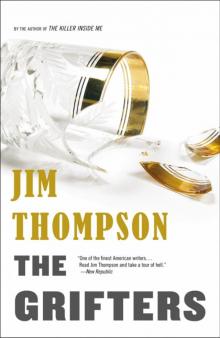 The Grifters
The Grifters The Transgressors
The Transgressors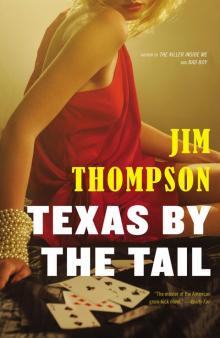 Texas by the Tail
Texas by the Tail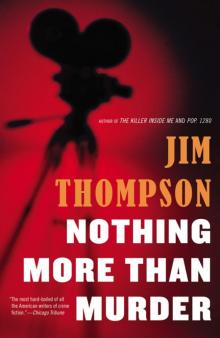 Nothing More Than Murder
Nothing More Than Murder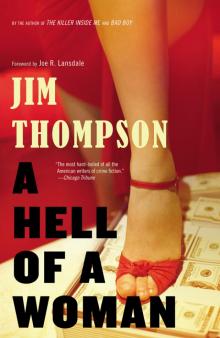 A Hell of a Woman
A Hell of a Woman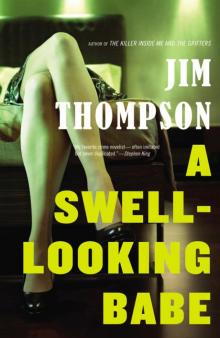 A Swell-Looking Babe
A Swell-Looking Babe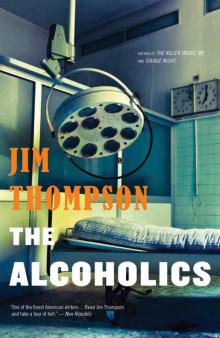 The Alcoholics
The Alcoholics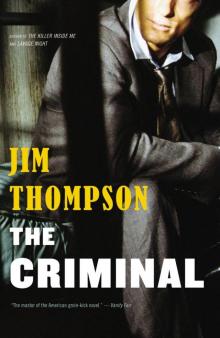 The Criminal
The Criminal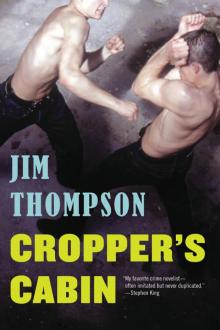 Cropper's Cabin
Cropper's Cabin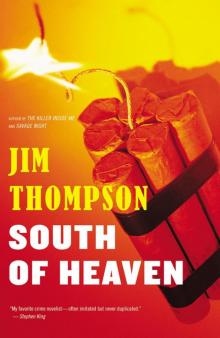 South of Heaven
South of Heaven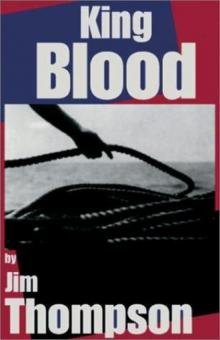 King Blood
King Blood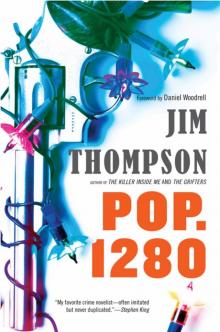 Pop. 1280
Pop. 1280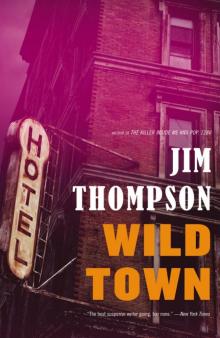 Wild Town
Wild Town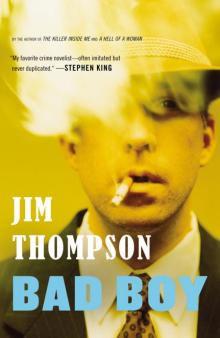 Bad Boy
Bad Boy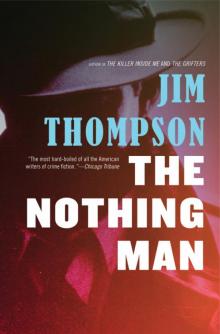 The Nothing Man
The Nothing Man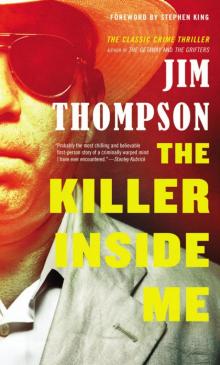 The Killer Inside Me
The Killer Inside Me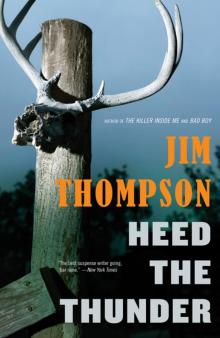 Heed the Thunder
Heed the Thunder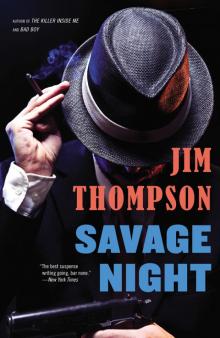 Savage Night
Savage Night Recoil
Recoil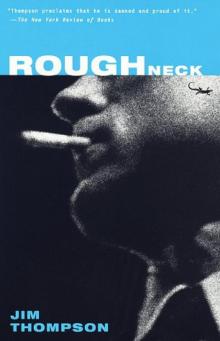 Roughneck
Roughneck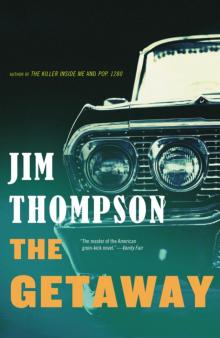 The Getaway
The Getaway